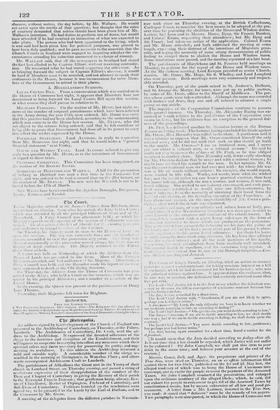irbe iiirtropOI61.
An address signed by ii,a4S elegymen of the Church cf England was presented to the Archbishop of Canterbury, on Thursday, at the Palace, .Lambeth. The Archdeacon of Canterbury, Dr. Croft, read the address to the Archbishop. It expressed the devoted adherence of the clergy to the doctrines and discipline of the Establishment, and their willingness to cooperate in carrying into effect any measures which their spiritual rulers may deem neeessary for preserving its purity, and augmenting its usefulness. To this address the Archbishop returned a mild and suitable reply. A considerable number of the clergy assembled in the morning at Itivington's, in Waterloo I'lace ; and afterwards accumpauied Archdeacon Croft to Lambeth.
The parishioners of Allhallows the Great met in the Vestry of their church in Lombard Street, on Thursday evening, and passed a string of resolutions expressive of their disapprobation of the conduct of the Dean and Chapter of Canterbury in giving the Rectory of their parish to the Reverend Francis Daweon ; that gentleman being, already, Rector of Chieellairst, Rector of Orpington, Prebend of Canterbury, and SulaDian of Canterbury. Petitions founded on the resolutions were agreed to; to be presented to the Lords by the Earl of Durham, and to the Cemnions by Mr. Grote.
A meeting of the dehgates from the different parishes in Westmin ster took place on Thursday evening, at the British Coffeehouse, Cockspur S-reet, to consider the best means to be adopted at the present time for procuring the abolition of the House and Window duties. Letters ha I been sent to Messrs. Hume, Byng, Sir Francis Burdett, and Coloue! Evans, requesting their attendance; but Mr. Byng and Sir Franci had taken no notice of the application. Colonel Evans and Mr. Hume attended ; and both addressed the meeting at some length, expaasing their distrust of the intentions of Ministers generally, arid urging the necessity of some strong demonstration of public feeling to compel them to abolish the House and Window taxes. Some resolutions were passed, and the meeting sepamted at a late hour.
The parishioners of Marylebone and St. Pancras held meetings on Monday, to petition for the repeal of the House and Window taxes. At the Ma' ylebone meeting, Lord Kenyon presided as senior Churchwarden. Mr. Hume, Mr. Hope, Sir S. Whalley, and Lord Longford also were present. Both meetings were very numerously and respectably attended.
On Thursday, part of the goods seized in St. Andrew's, Holborn, and St. George the Martyr, for taxes, were put up to public auction, by order of Mr. Davis, officer to the Sheriff of Middlesex. The parties whose goods were taken attended. Although the room was crowded with brokers and Jews, they one and all refused to advance a single penny on any article.
The inquiries of the Corporation Commission continue to possess little general interest. On Thursday, Mr. Alexander Baring was examined at length relative to the jurisdiction of the Corporation over sworn brikers ; but his evidence was no exception to the general dulness of the proceedings.
Dr. Prat: has delivered another St. Simonian lecture at the Burton Rooms on Friday week. The lecturer havingemicluded his tirade against Mr. Owen, Miss Macauley was called to the chair. A gentleman said it was a mistake to suppose that Mi. Owen considered himself the only rational luau; and he did not wish that such an idea should go forth to the world. Mr. Owen—" I am an irrational man, and I never yet saw either a rational man, or a rational woman." He said he could not seiy to answer the address of Dr. Prati, as he was obliged Ii attend in another place. Miss Alacauley said, HMIs trolly shocking fin. Mr. Owen to declare that he never met with a rational woman ; he ini,dit have via:fined his remark to the men. In her opinion, Mr. 0. was the a lost irrational man she had ever met with : his whole life was was a life of words without actions : his energies, she would repeat, Weru wasted in idle talk. Works, not words, were what she wished fur ; and slit, wculd rather see one hour's practical exertion, than hear ten hours' tah Mg, although she was a woman, and women, it was said, 'eyed talking. She wished to see industry encouraged, and such prac. tiodt II:t•asttri,.. established as would raise our fellow-creatures, by hotuat indastry. frs in the necessity of obtaining their bread nom the 11:■: of cold charity, or the degrading operation of the Poor-laws. A Imot disci:I:shot ensiled, on the imprtcticability of Jr.:A Owell'S principles ; atter whieli the debate was :eljourned.
A lei,lilliarecd inan, of very it lilt and robust form of body, presented hinisa4 i the Westminster I o..pitttl a few days ago. in order to show hileself to the alit! .1.-111:tlit,t of the establishment. Ile is -qt•ly covered with 1 greun horny substaece in the form of eat Oissini:isr to those a inch at produced on the porettoine. s: ',Ii I we escaptql the t!,,formity are his film, the palms of is laid-., and of his feet ; every ot;,er part of his person is abun 0-4t I' iIjii oil w:th this green homy substam e. lie sheds his horns t;ttilis annually, anti a fresh crop stmec.•eds. Ile has bet the, afflicted sae his ea.best infancy ; and ill the male men:hers of his family, d,,.."11 feint! i!:1":VC■It griordlather,
have hem Widl i eeeeral health is excellent, :aal his secretions very regular. A
ii alt 1..;•: !V .4 I . iii a hint iti UDC W. the Borough liospitals.—Lon j.,n NILOC(11.14010?,11.


















 Previous page
Previous page